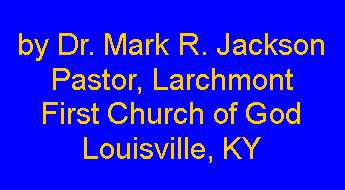

|
The Church of God Reformation Movement began in the late 1800s primarily under the leadership of Daniel S. Warner.† His vision was that of a unified, holy church that followed Scripture and was not divided due to denominational loyalties.† Soon others joined with him in proclaiming that God has only one church and that all those who are saved are part of this church.† They even urged people to leave denominations and to join with them in simply being the church.† The main avenue of getting their message out was a periodical known as The Gospel Trumpet.† Later its name was changed to Vital Christianity.† The general offices of the Church of God are located in Anderson, Indiana.† Currently, there are about 875,000 people connected with the Church of God and a little less than a quarter of a million of them are in the United States.† The following are key characteristics of the church of God:
Orthodox: The church of God embraces the orthodox teachings of Christianity.† These teachings include such beliefs as the Trinity (one God revealed in three Persons), the authority and inspiration of Scripture, salvation by Godís grace, and the substitutionary death of Jesus and his bodily resurrection.† The Church of God is fully within the bounds of orthodoxy.†
Arminian: The Church of God is Arminian in its theological stance rather than Calvinist.† We believe that God wants all to be saved and that Christ died so that all could be saved.† If people are not saved, it is because they have resisted the grace of God not because they were predestined to hell.† Also, we believe that a true believer can forfeit his/her salvation by persistence in unrepentant sin.†††
Holiness: The Church of God teaches that all believers can and should live a holy life.† The Holy Spirit fills and empowers believers to live in a way that pleases God.† Persistence in sin is contrary to who we are in Christ.† Though temptation remains a reality and unfortunately we donít always live up to our privileges in Christ, we can have real victory over sin even now.† In Christ we have been freed from the dominion of sin.
Non-Pentecostal: There are several groups that use the name ďChurch of God,Ē and most of them are Pentecostal.† However, we are not.† We are Pentecostal in the biblical sense of believing in the power of the Holy Spirit, but we are not Pentecostal in the contemporary sense of emphasizing tongues and believing that speaking in tongues is necessary for the Spirit-filled life.† We understand tongues to be the miraculous ability to speak in a known, human language unlearned by the speaker.†
Autonomous: Each church of God congregation is locally autonomous.† This means that the local church decides who its pastor is, how to budget its money, and many other things.† There is no outside hierarchy that sets the agenda for the local church.† Related to this is the fact that the church of God has no official, authoritative creed.† What unites us is not agreement on all points of doctrine, but a common experience of salvation in Jesus Christ. Scripture is our final authority, not any creed or confession.†
Non-denominational: We consider ourselves a movement rather than a denomination.† We donít believe that we are the only true Christians.† We believe that there are true Christians scattered throughout denominations.† But we believe that no denomination equals the church and that Godís plan did not include denominational strife and division.† Salvation does not make you a member of a denomination, but it does make you a member of Godís church.†
Amillennial: Eschatology has always been important to the church of God.† We are amillennial in our eschatological stance rather than premillennial or postmillennial.† The kingdom of God is present where Christians gather and proclaim the gospel, though its full manifestation awaits the coming of Christ.† That coming will not be preceded by a rapture or include an earthly kingdom being established in the Middle East.† When Christ returns, the final judgment will take place.
Scriptural Facts about the Church of God
†††††††††† Jesus organized it (Matt. 16:18). †††††††††† It is built on a good foundation (Eph. 2:20; 1 Cor. 3:11). †††††††††† Christ governs it (Eph. 1:22-23; Isa. 9:6). †††††††††† God admits members (Acts 2:47; 1 Cor. 12:13-18). †††††††††† Sin puts one out of it (Rom. 11:22; Ex. 32:33). †††††††††† Only the saved, and all the saved, are members of it (John 15:2-6). †††††††††† Membership is offered to all (Rev. 22:17). †††††††††† Final rewards (Rev. 20:12-15; 21:3-4; 22:14). †††††††††† Bible name of the church (Acts 20:28; Gal. 1:13; John 17:11).
|
